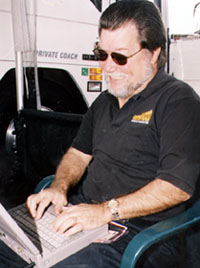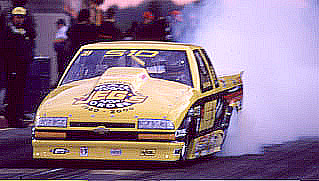
Coming on the heels of the revelation that the only legitimate corporate
sponsor in Pro Stock Truck racing will not return next season, NHRA's
decision to contest Pro Modified at selected 2001 events should have
sent a chill down the collective spines of those whose resources are
committed to the hot rod pickup class.
Castrol Super Clean, which last year backed the Kessinger Motorsports
Chevy S-10s driven by Steve Johns and Rob Slavinski, informed team owner
Jim Kessinger shortly after season's end that it would not return next
year despite the fact that Johns appeared in two final rounds, won the
O'Reilly Nationals at Dallas, twice was the No. 1 qualifier and finished
a solid third in the 2000 Winston driver standings.
 Photo
by Jeff Burk. The key point is that Super Clean probably isn't
leaving the sport. It's just taking its purple presence elsewhere. Photo
by Jeff Burk. The key point is that Super Clean probably isn't
leaving the sport. It's just taking its purple presence elsewhere.
On the heels of that bit of news, the NHRA has confirmed that it will
run Pro Modified Eliminator at four events next season after originally
announcing only that it would invite IHRA Pro Mod racers to participate
in the Federal Mogul sportsman Series by creating two classes within
the parameters of Competition Eliminator.
Even in Comp Eliminator, the presence of Pro Modified cars at NHRA
national events would have negatively impacted the Pro Stock Truck division
because, frankly, the class can't stand up to the inevitable comparisons.
Pro Modifieds are to Pro Stock Trucks what Jennifer Lopez is to Janet
Reno. It's not a question of technological superiority. It's speed and
power and variety on the one hand. On the other, it's slower-than-Pro
Stock Bikes, General Motors sameness. It's supercharged and nitrous
oxide-boosted 500 cubic inch engines versus 358-inch NASCAR motors.
Face it, race fans, Pro Stock Truck is in trouble.
Not that the end is imminent. But you can damn well see it from here.
The trucks definitely are headed down that one way road to Hell's Dragway
where the regular Saturday night fare is restricted to Factory Modified,
Super Eliminator, Top Gas and, starting next year, Pro Outlaw.
Unfortunately, the Trucks were in trouble from the outset, primarily
because the sanctioning body decided to add them to the program only
as an afterthought and never embraced them with the kind of enthusiasm
required of a start-up.
Reacting to NASCAR's initial success with its Craftsman Truck Series
and believing that the mere announcement of a Pro Stock Truck class
would set off a feeding frenzy among the major automakers, the High
Sheriffs created the class using all the foresight of Custer at the
Little Big Horn.
Unfortunately, throwing a bone to the automakers or, in this case,
throwing a bone to General Motors, isn't the best reason to create a
racing category. Ford never warmed to the idea of Pro Stock Truck. Dodge,
while involved, has been overwhelmed by Chevy and, to a smaller extent,
GMC with its Sonoma.
Without corporate sponsorship, there has been little effort to promote
the class or its participants. Chevrolet alone has carried the torch
and while it has done a good job, there's no way it can continue to
carry the load or the responsibility all by itself.
NHRA's commitment has been tepid, at best. One need look no further
than the purse structure. At the season-ending Auto Club of Southern
California Finals, the Pro Stock cars raced, in round numbers, for approximately
$92,000. The trucks for $23,000.
What the class hasn't lacked is participants, although most are sportsman
racers who saw Pro Stock Truck as their only opportunity to race "professionally."
The fact is, Pro Stock Truck has become what I despised about prototype
sports car racing of the kind formerly sanctioned by IMSA under the
Camel GT banner.
The seats in those cars invariably were for sale or lease - for a weekend
or a season. If you had money, shazam, in the blink of an eye you were
a professional sports car driver. Same today in Pro Stock Truck. If
you've got cash, an angel or a sponsor, rides are available for rent.
Granted, the trucks have their fans. There are just too few of them
to bring about any significant change in NHRA's attitude toward 180
mile-an-hour hay haulers. There just aren't enough of them to change
the prevailing attitude.
For example, when the truck program began, final eliminations were
contested on Saturday and the final round run AFTER the conclusion of
final qualifying in the Funny Car, Top Fuel and Pro Stock classes. It
was an embarrassing arrangement in that the bulk of the crowd bailed
out after the nitro cars ran.
To alleviate the situation, the NHRA this year incorporated truck eliminations
with all the others. It was much less embarrassing, but no more entertaining.
For the sport in general and NHRA in particular, the best case scenario
would be one previously suggested: the coupling of Pro Mod and Pro Stock
Truck to create a mutant hybrid. Pro Mod Truck. Nitrous oxide, superchargers
and Chevy S-10s. Now that's something that might create interest beyond
the participants.
Dave Densmore, a paid
columnist for DRO, also works for John Force.
Photo of Densmore by Jeff Burk
|